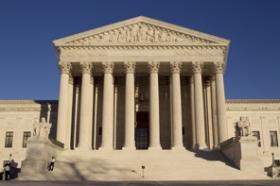Supreme Court: Alabama death-row inmate Cory Maples should get new hearing
 2012-01-19 The Washington Post
2012-01-19 The Washington Post
The Supreme Court on Wednesday ordered a new hearing for an Alabama death-row inmate who missed a critical appeals deadline because his lawyers at a prestigious New York law firm “abandoned” his case without telling him or court officials.
The circumstances surrounding the appeals of Cory R. Maples — which included a mailroom mix-up at the law firm of Sullivan and Cromwell that returned unopened an adverse ruling against Maples — created a “veritable perfect storm of misfortune,” Justice Samuel A. Alito Jr. said.
Such extraordinary events, the court ruled 7 to 2, meant Maples deserved another hearing.
“No just system would lay the default at Maples’ death-cell door,” Justice Ruth Bader Ginsburg wrote for the majority.
The justices normally are sticklers for deadlines and went to some length to explain that they were not adjusting previous decisions that say the mistakes of lawyers in post-conviction proceedings must be borne by their clients and cannot be grounds for a new hearing.
“A markedly different situation is presented, however, when an attorney abandons his client without notice, and thereby occasions the default,” Ginsburg wrote.
Maples was convicted in 1997 of shooting two acquaintances, Stacy Alan Terry and Barry Dewayne Robinson II, in the head after a night of drinking. Maples stole money and a car, and he confessed when captured two weeks later. He is not contesting his guilt.
Instead, Maples is arguing that the court-appointed attorneys at his trial, paid $1,000 for their work, were ineffective. He contends they mounted an incoherent defense and did not try to convince the jury that he may not have been responsible for his actions because of drug and alcohol use that night.
At sentencing, he contends, his attorneys acknowledged their inexperience, telling the jury that they “may appear to be stumbling around in the dark.” The jury voted 10 to 2 — the minimum number necessary — to recommend death.
Maples told The Washington Post last fall that he “thought I hit the lottery” when Clara Ingen-Housz and Jaasi Munanka, two Sullivan and Cromwell associates, volunteered to file his appeal.
They filed the petition on Aug. 1, 2001. The Alabama court rejected it on May 22, 2003. By then, Ingen-Housz had left the firm to work for the European Commission and Munanka had gone on to clerk for a federal judge. That precluded them from continuing to represent Maples.
They didn’t inform the court of their moves.
The court order denying the motion was mailed to Sullivan and Cromwell offices in New York; instead of passing the mail on to other lawyers at the firm, someone stamped them “Returned to Sender — Attempted Unknown” and, on a letter to Ingen-Housz, “Return to Sender — Left Firm.”
A copy also went to a third attorney — John Butler of Alabama, who signed on to the case as a needed local counsel — but he took no action because the New York lawyers were supposed to take the lead.
The court clerk took no action, either. And Maples didn’t learn of the adverse ruling until August 2003 — a month after the deadline to appeal had passed. After a frantic call from his mother, Sullivan and Cromwell lawyers went into action. But both state and federal courts said they could not waive the deadline.
Ginsburg said that the courts should have recognized the unique situation.
“Maples was disarmed by extraordinary circumstances quite beyond his control,” she wrote. “He has shown ample cause, we hold, to excuse the procedural default into which he was trapped when counsel of record abandoned him without a word of warning.”
Ginsburg was critical of Alabama’s justice system in her opinion. She said it does not require those who represent indigent capital defendants have any special expertise or training and pays them poorly. “Nearly alone among the states,” she wrote, Alabama does not guarantee representation to poor capital defendants in postconviction proceedings.
Alito joined the majority along with Chief Justice John G. Roberts Jr. and Justices Anthony M. Kennedy, Stephen G. Breyer, Sonia Sotomayor and Elena Kagan. But he did not join the criticism of Alabama’s system and said Maples should have been in good hands with “one of the country’s most prestigious and expensive” firms.
“What occurred here was not a predictable consequence of of the Alabama system, but a veritable perfect storm of misfortune,” Alito wrote. Justice Antonin Scalia, joined by Justice Clarence Thomas, said that Maples had not been abandoned and that the attorneys representing him had simply made mistakes. Other lawyers at Sullivan and Cromwell were familiar with Maples’s case, he said, adding that Butler should have taken action when he was informed that Maples’s petition had been denied.
Scalia said he suspected the majority was “motivated in large part by an understandable sense of frustration” that Alabama did not simply agree to Maples’s delay in filing the appeal.
But he said the decision “invites future evisceration of the principle that defendants are responsible for the mistakes of their attorneys” and provides a “template” for more challenges.
The case is Maples v. Thomas .


